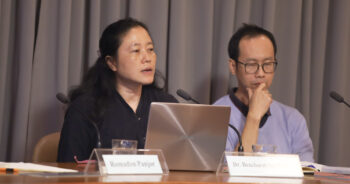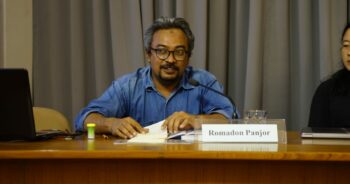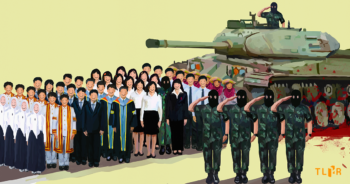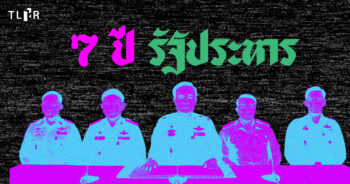To instigate an effective military coup, an aspiring dictator or junta must oust the ruling government and abrogate the existing constitution. Over the past eighty-six years since the end of the absolute monarchy in June 1932 in Thailand, soldiers who aspire to launch coups have learned that there is a third component of a ‘successful’ coup, or both capturing state power and avoiding prison: the amnesty. Across twelve coups, dictators and juntas have chosen to promulgate either stand-alone amnesty laws, to include an amnesty provision in the new constitution they draft, or sometimes to do both.
Following this well-worn path, the National Council for Peace and Order (NCPO) absolved itself of responsibility for carrying out the 22 May 2014 coup as well as all subsequent orders and announcements it unilaterally issued in two constitutional provisions. Articles 47 and 48 of the 2014 (Interim) Constitution, issued in July 2014, made the totality of the coup and all subsequent actions legal, constitutional, and final. It further stipulated, “If those acts constitute offences under the laws, the persons who commit those acts shall be entirely discharged from such offences and liabilities.”
Resistant Citizen, an anti-coup activist group at Criminal Court on 22 May 2015.
On the one-year anniversary of the coup, fifteen members of Resistant Citizen, an anti-coup activist group, submitted a criminal complaint and request for General Prayuth Chan-ocha, the head, and the other four members of the NCPO to be prosecuted for launching the coup and the subsequent human rights violations the NCPO inflicted on Thai citizens. The complaint outlines a logic through which the amnesty clauses in the constitutional provisions may be challenged. The series of reactions by the courts, the latest by the Supreme Court in mid-2018, reveal both the strength of the obstacles to effecting those challenges to the new constitutional provisions, as well as a sliver of possibility to do so.
Resistant Citizen called for General Prayuth Chan-ocha and the other members of the NCPO to be prosecuted for violation of Articles 113 and 114 of the Criminal Code. Article 113 defines the crime and stipulates the punishment for rebellion and Article 114 does so for treason. The coup was a rebellion and the subsequent dispossession of the people’s constitutionally-protected sovereignty was treason. They bring the complaint both as individuals directly-injured by the crimes and on behalf of all Thai people, the owners of sovereignty. The people’s status as the owners of sovereignty comes from its stipulation in the 2007 Constitution and through their actions in defense of democracy.
The idea of the people that animates the complaint is heavily rooted in a strong sense of civic responsibility. Resistant Citizen explains why they have brought the complaint: “Even the civil servants, whose salary comes from the taxes of the people, were not courageous enough to stand up to the power that emerged from the barrel of a gun. It was only the people, the citizens, who courageously dared to rise up to oppose the dictatorial power of the junta, as has been seen from the past until the present.” The NCPO seized the organs that exercise sovereignty on behalf of the people – the executive, legislative, and judicial branches, but they cannot seize the people’s sovereignty. The complaint is a courageous, and utopian, affirmation of the people’s sovereignty. Under the Criminal Code, rebellion is punishable by life imprisonment or the death penalty and treason by imprisonment of three-to-fifteen years. Resistant Citizen called for a heavy punishment in order to cease the cycle of coups and amnesties.
The Court of First Instance dismissed the complaint. Resistant Citizen appealed and the Appeal Court dismissed it as well. Both lower courts dismissed the complaint summarily without examination or exploration. Resistant Citizen then petitioned the Supreme Court, which issued a ruling on 27 March 2018 that was not read publicly until 22 June 2018. The Supreme Court also dismissed the complaint, but did so in a manner which raised questions about the meanings of sovereignty, the state and democracy. This is evident in the differences between the fundamental principles underlining the Resistant Citizen complaint and the Supreme Court decision. On the one hand, the Supreme Court fundamentally denied the basis of Resistant Citizen’s complaint by affirming the legality of the laws as drafted and enforced by the NCPO. On the other hand, the Court unexpectedly moved beyond the realm of law to query the place and meaning of justice in the polity.
Resistant Citizen framed the content and basis for bringing their complaint through a precise definition of sovereignty and the people as the owners of sovereignty. The Supreme Court does not refute this claim, but instead defines the meaning of a state. The Court writes that, “To fulfill the conditions of being a state, a given state must be comprised of a clearly demarcated territory, a population must reside in this territory, a government must rule this population, and the state must be sovereign. An important point of legal interpretation is that law must be interpreted in such a way that it can be enforced. Even though it may as well be as the fifteen plaintiffs have claimed that the 2014 (Interim) Constitution is an illegitimate form of law, the interpretation of law must lead to enforcement according to what is written in the service of the maintenance of the state or country. Otherwise, the status of being a state or country will be damaged and its sovereignty will not be intact. The facts indicate that on 22 May 2014, the NCPO seized the administrative power of the country in its entirety from the caretaker government. The NCPO declared that the 2007 Constitution, the cabinet and the senate were void. At that time, Thailand was without any unit that performed legislative duties.” The Court’s hands are tied because the law as written indicates that the NCPO is the state and this law protects the state. If the law is not adhered to, the sovereignty of the state will not be intact. The court is clear that they are acting in the service of the enforcement of the law as written.
Yet the Court is aware that this law may have an unjust basis. They continue, writing that “The NCPO instead entered to exercise the authority of the sovereign, even though, as the fifteen plaintiffs have claimed, that authority was secured in a manner not in accordance with democracy. Whether or not that power was legitimately obtained is another issue to be discussed elsewhere. But the NCPO still retains power in the sense that it is a group of individuals that exercises the administrative and legislative power by controlling the mechanisms and agencies of the state.” The message bears repeating for emphasis. At the very moment that the court affirms amnesty for the 22 May 2014 coup, they note that, “Whether or not that power was legitimately obtained is another issue to be discussed elsewhere.” The details of this discussion, including who will take part in it and when it will be held, are left unspecified. But with one sentence, the Supreme Court has signaled a question about the legitimacy of the coup.
Raising the reconsideration of the justness and legality of the coup, and therefore the possibility of holding General Prayuth Chan-ocha and the other members of the NCPO to account, is apt during the days leading up to the 24 March 2019 elections. The 2017 Constitution, drafted by a junta-appointed assembly, preserves a place for the military in rule for the foreseeable future. But as the events of the months of campaigning leading up to the election indicate, many people are beginning to question the desirability and efficacy of military rule.
Full-text English translations of the Resistant Citizen complaint and the Supreme Court’s dismissal are provided at the links below to invite reflection on the legality, and politics, of coups and military rule. Critics may say that the Resistant Citizen complaint is not significant because they were unsuccessful in bringing a case against the NCPO, or that the Supreme Court decision can only be read as an affirmation of the legality of coups. In contrast, I urge a reading of the Resistant Citizen complaint as a demonstration of the role of the people in a democracy and the Supreme Court decision a reminder of how long and halting the struggle to actualize the people’s role in democracy may be. Taking this struggle seriously – through attention to its details, lessons, and latent possibilities – is necessary at a moment when Thailand may be poised on the precipice of a transition to a more just, democratic polity after almost five years of military rule. The people may become the owners of sovereignty again.
Read the Resistant Citizen criminal complaint against the NCPO (22 May 2015).
Read the Supreme Court ruling on this complaint (27 March 2018).




